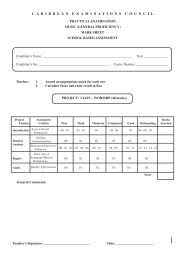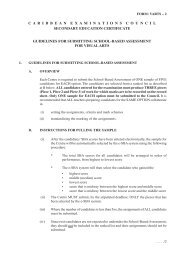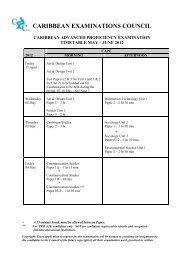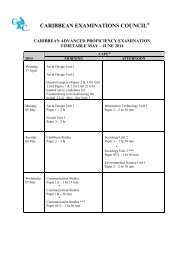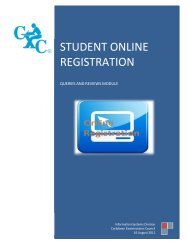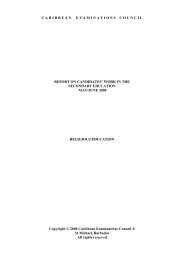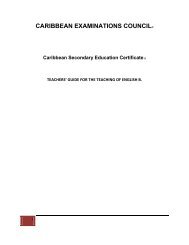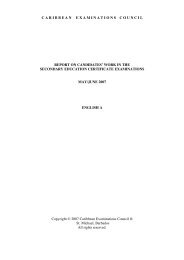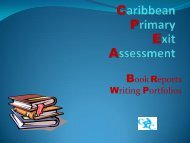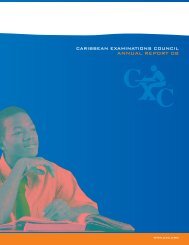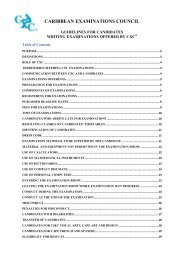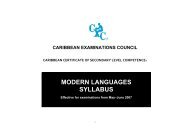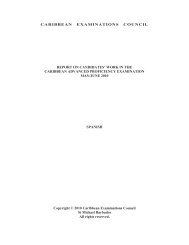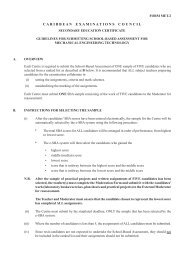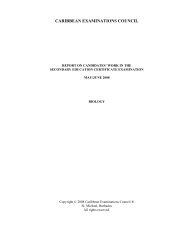CXC Examiner May 2012 - Caribbean Examinations Council
CXC Examiner May 2012 - Caribbean Examinations Council
CXC Examiner May 2012 - Caribbean Examinations Council
Create successful ePaper yourself
Turn your PDF publications into a flip-book with our unique Google optimized e-Paper software.
The <strong>Caribbean</strong> <strong>Examiner</strong>JENNISA NANDOOThe Rigour of CAPE paid off at LSECAPE Students’ TestimonialsAdmittedly, afterthe hype of beingadmitted to sucha prestigiousinstitution likethe LSE to studyInternationalRelations haddied down, Iwas assaulted by an attack of nerves and panic,wondering if my secondary school education,and in particular, my CAPE preparation,would leave me at a gross disadvantage to otherstudents coming from different institutionalbackgrounds. Indeed, the LSE, which boastsstudents from more than 150 countries, takes inthe crème de la crème of students from differentinternationally recognised examinations such asthe International Baccalaureat, A-Levels, SATsand French Baccalaureat. As CAPE was generallya more recent examination system, I could nothelp but feel intimidated by my new peers, evenbefore classes had actually begun!However, on my first meeting with myacademic advisor who is a lecturer at the LSE, myfears were greatly alleviated when he remarkedthat he had looked through my academic recordand was quite impressed with my achievements.I breathed a sigh of relief, thinking that if a topnotchlecturer who deals with so many studentsfrom so many different academic backgroundscould be impressed by my CAPE qualifications,then maybe I wasn’t on such a bad footing afterall vis-à-vis my future classmates.Yet it was truly in the classroom that myfears were firmly laid to rest. I realised that CAPEwas more than just an examination, that CAPEis a system, designed to encourage studentsto function at maximum efficiency, givingmaximum results. In my French and Spanishclasses, I found that the rigorous teaching andtraining that I had received in Sixth Form andthe demands of the CAPE Foreign Languagesyllabi meant that I easily outperformed myclassmates in many areas, or even matched thestandards of those who had spent a substantialamount of time in France or Spain, or who wereeven French or Spanish by nationality. Clearly,this was no small feat.Even in my other courses where a sharp,critical mind was required to analyse the worldaround us, and the changing lands CAPEof international relations, I found that theknowledge of History that I had gained fromCAPE greatly aided my understanding andappreciation of course materials. What I hadthought was an overloaded syllabus when Iwas in Sixth Form, turned out to be a blessingin disguise, especially as in my first year at theLSE, I had to take a history course which coveredtopics that I had already mastered in my CAPEexaminations. Furthermore, the countless hoursspent in researching and preparing IAs for myforeign language subjects, for History and for<strong>Caribbean</strong> and Communication Studies madea huge difference to my research ethic whenconducting obligatory research assignmentsof my own at the LSE. Special mention mustbe made of my History IA and the researchmethods classes of <strong>Caribbean</strong> Studies whichhave truly proven to be worth their weight ingold. The communicative skills taught in theCommunication Studies syllabus also provedimmensely helpful as I delivered my obligatoryclass presentations, receiving consistently highmarks for my presentation style and content.Lastly, it is an undeniable fact that to surviveand succeed at CAPE, one has to master timemanagement and this taught me invaluablelessons which continue up to today to affectmy time at the LSE. I learnt how to manage myacademic priorities, with my social and extracurricularlife and I have adapted these lessonsto my survival in London. Indeed, CAPE taughtme how to cope successfully with a challengingenvironment, and a challenging environmentcertainly characterises what I found myself upagainst when I commenced my studies at theLSE. In fact, this is a lesson for life especiallyas the world of work becomes more and morecompetitive and demanding.Given these life-long lessons that I acquiredduring CAPE, I realised on reflection that I wasnever at a disadvantage to the other students atthe LSE. In fact, I was just as good, or even betterin some respects, and for this I am truly grateful.There is nothing sweeter than being confident inone’s knowledge and in one’s ability to do one’swork well. The rigours of CAPE helped me tostand secure in this confidence in a world ofacademic elite, where it is an accepted ethos thathard work truly pays off. Now, as I am aboutto leave the hallowed halls of LSE, I know for afact, that had I not mastered the strategies andknowledge imparted by the CAPE system, thenI would not have been able to survive the past 3years. Therefore, it is to this system that I owe asubstantial part of my gratitude.Jennisa Nandoo won the Regional Top Awardfor the Most Outstanding Performance inModern Languages in 2008. She is a formerstudent of Naparima Girls’ High School,Trinidad and Tobago. Jennisa is graduating fromLSE in <strong>2012</strong>.www.cxc.org MAY <strong>2012</strong> 39



